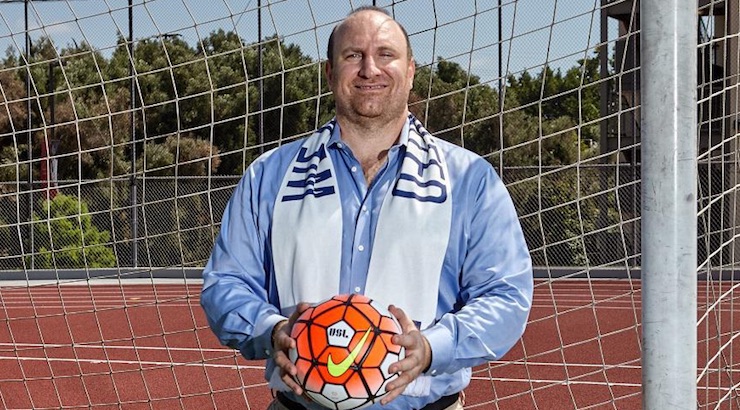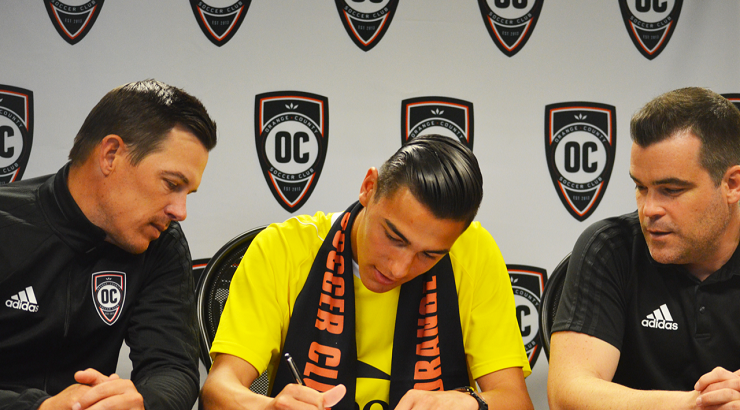Soccer in America — Leading The Way Forward Series
Developing World Class Players in the USA: Eliminating the Difficult Choice Between a Fully Funded College Scholarships and Going Pro
USL’s Orange County SC Creates Real Opportunities — Provides Fund to Cover College Tuition for Young Players Who Sign Pro Contracts
This is SoccerToday’s new series on influencers in the beautiful game — and James Keston is the owner and president of the United Soccer League (USL) Orange County SC (OCSC) and has created a revolutionary concept — An Orange County SC Educational Fund to help cover the cost of a college education for young players who sign professional contracts with OCSC.

The USL, one of the most prominent Division II pro soccer leagues in the world, is raising its profile and increasing its focus on delivering a higher level of competition. With a new ability to trade or sell international roster spots within the USL for the duration of a season and a new emphasis on USL Academy contracts, America’s DII league, which is now officially rebranded as the USL Championship, is raising the bar on the game — and Orange County SC continues as a top innovator, creating meaningful opportunities for today’s top youth players.
Orange County SC has set up a very innovative fund where the proceeds can be used to offset the cost of college. Comparable to a college scholarship, the OCSC fund can be commensurate with what a player could receive as a scholarship for playing collegiate soccer.
Soccer Today’s Interview with James Keston — USL’s Orange County SC Owner & President On Meaningful Change and Creating Opportunities For Today’s Youth

Diane Scavuzzo: Orange County SC provides an opportunity for young players to take a chance on themselves in reaching their dream of becoming a pro, and not sacrifice the opportunity to go to college.
James Keston: Correct. In many situations, a player is not even sacrificing college time — if he signed as a 16-year-old, completes a three-year contract and then decide he wants to go to college, he will be attending college at the same time as his high school classmates and friends.
Diane Scavuzzo: You set this fund up prior to signing 16-year-old goalkeeper, Aaron Cervantes, to a pro contract with Orange County SC. How does it work?
James Keston: It is simple. It is a pool of funds that can help offset the costs of attending college.
For example, If Aaron Cervantes or another of our youth players who have signed a USL pro contract with Orange County SC decides that being a professional soccer player is no longer his dream, or for whatever reason, the coaches chose not to renew a player’s contract, the player would have funds put aside to be able to go to college.

Diane Scavuzzo: In America, the main destination for the majority of youth soccer players is college. Many parents pay for club soccer in the hope of earning a college scholarship. Players, of course, dream of becoming a professional.
This leaves families at odds when it comes to a talented youth player considering a USL contract. The OCSC Educational Fund eliminates the difficult choice of choosing between a college scholarship and signing a pro contract.
James Keston: Yes. We wanted to remove this barrier and allow the best youth players the opportunity to explore signing pro contracts.
Many elite youth soccer players share the dream of becoming a professional. But, it is a very different thing when faced with the decision to give up a full, four-year college opportunity for a chance to become a soccer professional.
We wanted to provide future opportunities for the players who want to try to be a pro.
Orange County SC Educational Fund gives players a second chance to offset the cost of higher education.
If at the end of a player’s contract, the player wants to go to college, the funds will be released and, if they also ‘banked” their salary by saving, they will have a significant amount of money available for college.
All the player has given up is the opportunity to play college soccer.
Most extremly talented players would rather try to become a pro and sign a USL contract than play college soccer.

Diane Scavuzzo: Could the combined salary and the educational fund reach $100,000?
James Keston: Yes, this is a completely brand new innovative program we launched.
I want Orange County SC to be recognized for being forward-thinking, innovative and responsible to our players.
I am not aware of any other system that has been developed like this where it is really linked to a contract for a player to rely on if for any reason he decides not to pursue professional soccer.
If you have saved the contract money along with the Education Fund, you can have up to $100,000 in the bank and from a parent’s perspective, they will not have lost the financial opportunity to pay for college at all — they have just given themselves the opportunity to try to become a professional soccer player and, enjoy what is, in many cases, a potentially spectacular life.

Diane Scavuzzo: What inspired you to create this portion of Orange County soccer club?
James Keston: Everywhere else in the world, when an extremely talented player gets to the age of 15 or 16-years-old, they make a determination that they want to potentially become a professional soccer player — and then they focus most of their time and energy on soccer and play throughout the year.
They are focused on being the best soccer player that they can be. That seldom if ever happens in the United States.
That is obviously changing a little bit. Creating the OCSC Educational Fund lets a kid explore becoming a professional soccer player without giving up his opportunity to getting a great education.
Our hybrid model creates real possibilities for soccer our country.
This would have been appealing to me if I was a talented youth soccer player.
And, this would be appealing to me if I was a parent of a talented because you are simply giving your child more opportunities to figure out what they want to do with their lives and fulfill their dreams — and, what you are giving up is very little.

We wanted to offer parents the opportunity to make a choice that was rational — one that offered very positive outcomes for their kid regardless of what path they choose.





